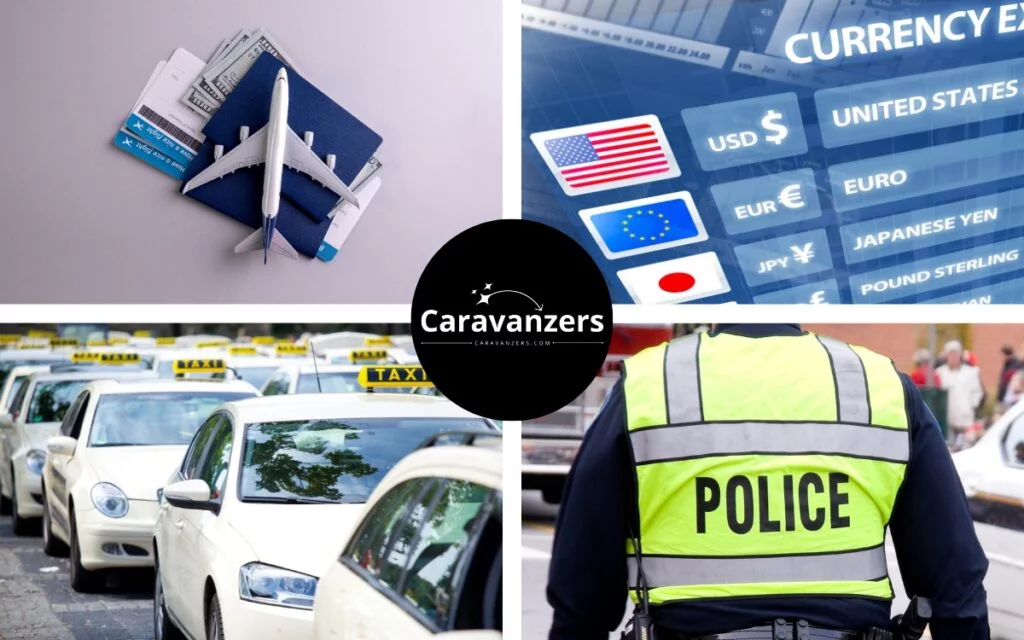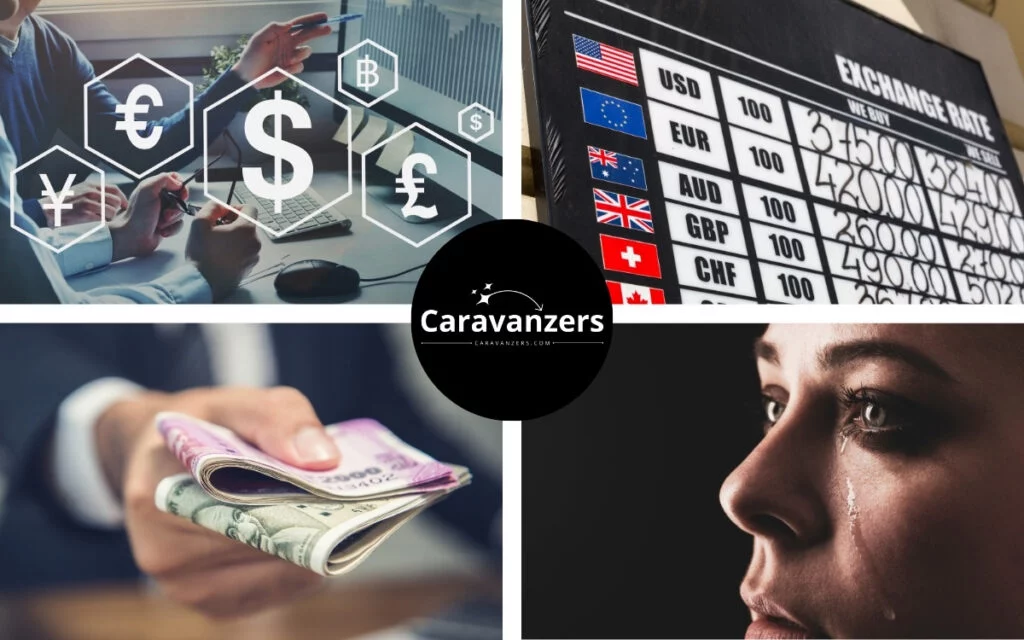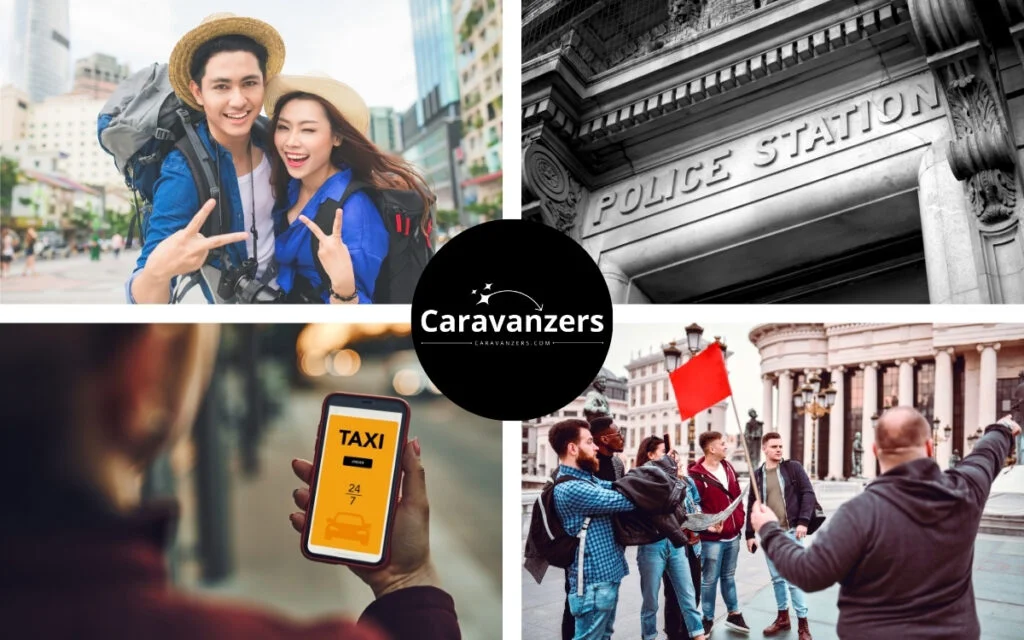
Travel scams are really not nice to experience when you are supposed to be euphoric on a bucket list trip, but this guide has got your back.
As I have learned personally countless times, travelers in popular destinations are bound to encounter various scams.
Expect fake taxis, accommodation schemes, currency fraud, and so much more.
So, in this guide, I will share some of the more popular travel scams, as well as what to do to stay safe.
Therefore, if you’re planning a trip, make sure to get your pen and paper out because I will give you a ton of tips and ideas.
Scam Definition
Before we go anywhere, let’s actually define what this is. We need to set the scene, so to speak.
So, what is a scam? A scam is a deceptive or fraudulent scheme designed to trick people into believing or doing something that is not in their best interest.
As you can imagine, it typically involves manipulation, misrepresentation, or the exploitation of trust to gain an advantage.
Unfortunately, this often results in financial losses, theft, or other harmful consequences for the victim.
Of course, scams can take various forms, including online, financial, and travel, among others.
Because they often exploit the vulnerabilities or lack of awareness of the targeted individuals to achieve their dishonest objectives, it’s super important to know about them.
Let’s continue…
Travel versus Tourist Scams

Naturally, not all scams are created equal, and, just as relevant, travelers experience different types.
The two main sub-types are travel scams and tourist scams. As you will soon see, they are different.
So, travel scams are the deceitful practices that travelers, in general, may encounter, such as fraudulent tour operators or misrepresented accommodations.
Grandma is on her way to see her newborn grandchild, but a storm keeps her in a small town.
A friendly-looking fella approaches her, telling her how he has a great place for her to stay.
He may have just scammed her into staying in his unsafe property since it isn’t insured as an accommodation.
On the other hand, tourist scams specifically target tourists, often exploiting their unfamiliarity with local customs or surroundings.
“Hey, friend!” says a handsome guy at the airport, and you smile back and say hello.
Bad, bad idea.
That is, tourist scams can include activities like fake guides, overpriced services, or distracting techniques to facilitate theft.
While both involve deceptive tactics, travel scams include a broad range affecting any traveler, whereas tourist scams are narrowly focused on exploiting the vulnerabilities of individuals specifically identified as tourists in a particular location.
Awareness of these distinctions can help travelers navigate unfamiliar environments more effectively.
In this guide, I’m covering travel 16 popular travel scams that both travelers in general and tourists may experience.
1. The Flight Scam
You have a travel bucket list, and you finally identify a destination on your places to go.
Great.
Now, it’s time to book a flight.
But, wait, wait—what about flight scams?
Flight scams commonly involve deceptive practices related to booking or boarding flights.
For example, online ticket scams may feature fake travel websites offering unrealistically low prices.
This leads to financial loss and no actual reservation.
Another scheme involves phishing emails or messages claiming to be from airlines. In the process, they trick recipients into providing personal information.
Of course, some scammers pose as travel agents or use fake booking platforms, exploiting unsuspecting travelers.
So, I can’t stress enough how important it really is to verify the legitimacy of booking sources.
Plus, avoid sharing sensitive information through unsolicited messages.
Finally, please use reputable platforms to minimize the risk of falling victim to flight-related scams.
2. The Visa Scam
You got your flight. Maybe you want to visit India. Great, but now you will need a visa, right?
Oh, this is another area to be careful because there are scams in the visa space, too!
So, visa scams tend to target people seeking visas for travel or immigration. They have a few ways they get you.
First of all, fake visa websites may impersonate official government platforms. This scam tricks applicants into paying for nonexistent services.
Then, of course, some scammers pose as immigration consultants. They will promise expedited visa processing for a fee… only to disappear with the money.
Another common scheme involves fraudulent job offers abroad. These scams require payment for visa sponsorship that never materializes.
Meanwhile, travelers may encounter fake visa agents providing counterfeit documents.
So, how can you fight these scams?
Vigilance, verifying official channels, and consulting with legitimate immigration authorities are crucial to avoid falling prey to visa scams.
Make sure that you only go through the lawful application process.
3. The Currency Scam

You got your flight and visa, and you arrived at your beautiful destination in style. Did you know there are scams waiting for you at the airport?
Yup!
Airport scams welcome you to the country, and there are a ton of them to be careful of.
First of all, there is the foreign currency scams targeting travelers. These often occur upon arrival in a new country.
Scammy money changers may offer seemingly favorable exchange rates but provide less currency than promised or use rigged calculators.
Likewise, some scammers operate unofficial currency exchange services without proper authorization.
As you can imagine, that leads to unfair rates and potential legal issues.
Also, in crowded exchange offices, deceptive tactics, such as distraction or sleight of hand, may be employed to shortchange unsuspecting visitors.
So, how can you guard from these scams? You should exercise caution, use reputable currency exchange services, and be wary of unsolicited assistance.
Doing those things will help you avoid falling victim to these common foreign currency scams when arriving at a new destination.
4. The Taxi Scam
Before you leave the airport, there is one more scam awaiting you… and that is a famous cab scam.
So, taxi scams target travelers, especially in airports or citywide destinations. At airports, fake taxi services with similar-looking vehicles may operate outside terminals.
You really have to be careful here, and I would suggest going with one of those taxi booth windows (and inside the airport).
Likewise, make sure to use pre-paid because dishonest drivers may refuse to use the meter or take an unnecessarily long route, inflating fares.
In citywide scenarios, drivers might manipulate meters, claim a fixed rate, or insist on a higher fare.
Plus, some use broken meters to overcharge passengers, and this type of scam is really hard to fight.
In some cases, drivers may recommend overpriced hotels or attractions, receiving commissions.
So, to avoid taxi scams, it’s crucial to use licensed, reputable services, insist on meter usage, agree on fares beforehand, and stay informed about standard rates.
5. The Hotel Scam
Your taxi will whisk you over to the place you are staying but don’t think the scams are over just yet.
Accommodation scams target travelers seeking lodging, including showing up to “find out” your room had been given away.
Generally speaking, this scam will require a transfer to another room, and sadly, it will often be a “lower” class.
So, the scam is to “upgrade” you, which typically means getting the room you already paid for in the first place.
Likewise, fake online listings on some platforms may showcase nonexistent properties or use stolen images, leading to payments for nonexistent bookings.
Similarly, scammers might create deceptive websites mimicking reputable hotels, tricking individuals into making reservations and payments.
Is that “Hilton” website with a huge discount a real one?
Meanwhile, unsuspecting tourists may encounter unauthorized individuals posing as hotel staff, attempting to collect payment or personal information.
This typically happens when you arrive late, and your real hotel staff left for the night, but “miraculously” someone shows up.
“Sorry you had to wait!”
You grin from ear to ear… not knowing you’re in for a scam.
Also, rental scams involve fake landlords requesting upfront payments for apartments or homes that are not available.
So, to avoid accommodation scams, you really should only use trusted booking platforms, verify property details, and avoid making payments outside official channels.
Just be cautious of unexpected requests for personal or financial information.
6. The Restaurant Scam
After a long trip, you finally settled into your new place and maybe even took a shower. Naturally, you want to eat next.
And that is where another scam awaits you, where restaurant scams take various forms to exploit diners.
In some cases, menu manipulation involves charging higher prices or adding hidden fees not initially disclosed.
“Oh, we thought you wanted the premium wine!”
What?!?!
Likewise, unscrupulous establishments may recommend unnecessary or overpriced items in an effort to exploit your unfamiliarity with local cuisine.
Some restaurants engage in credit card fraud, skimming, or double-charging customers.
And the worst kind? They copy your card and use it after you leave, knowing you won’t check your statements for a while.
Of course, fake reviews may mislead you into choosing subpar establishments, where those “customer” reviews are from family and friends who are in on this terrible scam.
Meanwhile, misleading advertising, such as false claims of discounts or specials, can deceive you.
So, how do you survive these restaurant scams? You should research reviews, confirm prices before ordering, and use reputable establishments.
And you should definitely check bills thoroughly and be cautious of unexpected add-ons.
Finally, please check your travel credit card or bank card daily. This will keep you informed about what’s being charged.
7. The Tour Scam

After settling into your hotel, eating some delicious local stuff, and gathering yourself, you will probably want to get touristy.
And this leads to another scam, where people exploit travelers seeking enriching experiences.
In some cases, fake tour operators offer attractive packages with hidden costs, leading to unexpected expenses.
Likewise, scammy guides may coerce participants into overpriced shopping stops or demand additional tips beyond agreed-upon amounts.
Similarly, scammers may sell counterfeit tickets to popular attractions, causing disappointment and financial loss.
Meanwhile, some unauthorized guides provide inaccurate historical information or misrepresent the significance of sites.
So, how should you deal with scam tours? Verify the legitimacy of tour operators, read reviews, and clarify all costs upfront.
Finally, avoid spontaneous bookings to safeguard against common tour scams and ensure a genuine travel experience.
8. The Beggars Scam
In many popular destinations around the world, top tourist sites open you up to a lot of risks in scams.
One of the most popular ways this manifests is through beggars. Begging scams exploit people’s compassion for personal gain.
Some beggars may pose as needy, presenting fabricated stories to elicit sympathy and financial assistance.
Fake disabilities, scripted narratives, or the use of props to evoke pity are common tactics.
The worst of it is that scammers operate in groups, targeting crowded tourist areas, which means you say “yes” to one… and you’re flooded.
Plus, some beggars falsely claim to be raising funds for charitable causes, pocketing the donations.
Meanwhile, organized begging rings exploit children for emotional manipulation. The worst of this, in my opinion, is when they harm these kids so they look even more sad.
I once learned a young child was amputated by a gang to use in begging.
Can you imagine?
It’s so awful.
But the good news is that there are ways to beat these scams. First of all, understand that these scams use psychology against you.
You feel bad because you are a privileged traveler, and they use that to make you fall into their traps.
So, avoid falling victim to this by donating to reputable charities. Research the destination ahead of time and donate to real causes that help real locals.
Finally, please understand that your presence in that country is already helping! You’re bringing your hard-earned dollars to that economy.
9. The Shopping Scam
One of the most lucrative scams you will hear about during your travels around the world centers on shopping.
Shopping scams in popular destinations often involve deceptive practices targeting tourists.
For example, counterfeit goods are prevalent, with scammers selling fake luxury items or replicas at inflated prices.
It may “look” and “feel” like a diamond, but there is a real possibility it isn’t.
Likewise, some establishments use bait-and-switch tactics, displaying high-quality items but delivering inferior products.
Of course, you will also see unscrupulous vendors insisting on cash payments to avoid traceability.
In certain markets, aggressive sellers employ high-pressure tactics, coercing buyers into making hasty and regrettable purchases.
Fake discounts and overcharging are also very common, exploiting tourists’ unfamiliarity with local prices.
So, to navigate shopping scams, you should research fair prices, be wary of aggressive sales tactics, and use reputable vendors.
Finally, please inspect items carefully before making purchases, and don’t be afraid to say that you need to “sleep on it” before buying.
10. The Souvenir Scam
We all want to bring back memorable items from our trips, especially exotic ones, right?
Unfortunately, this means there are plenty of scam artists who want to use this against us, too.
Souvenir scams target tourists seeking mementos of their travels, where some vendors may sell overpriced or low-quality souvenirs.
This really sucks because they are exploiting our desire for authentic keepsakes.
Likewise, scammy sellers use deceptive advertising, claiming items are handmade or locally crafted when they are mass-produced.
This is a major problem in ancient cultures like India and China, where mass production was easy due to the huge populations.
I once had to warn someone in Beijing because they were about to get a beautiful pendant that was supposedly from the Qing dynasty.
It was definitely beautiful, but it was also clearly not real.
So, fake antiques or historical artifacts can be presented as genuine, deceiving unsuspecting buyers.
In some cases, vendors may employ high-pressure tactics, insisting on immediate purchases.
To avoid souvenir scams, you really should research local prices, patronize reputable shops, and be skeptical of overly aggressive sellers.
Finally, please check carefully the presented items for authenticity before making any purchases.
11. The Bar Scam

Oh, my goodness, talk about your fun night out turning awful. Bar scams targeting tourists are diverse and often aim to exploit unfamiliarity.
For example, some establishments might overcharge by presenting inflated bills or adding hidden fees to the final total.
This especially happens later in the night… when they know you had a few in you.
Scammy bartenders may use rigged or altered cash registers to manipulate prices. They do it in front of you so you don’t think they have anything to hide.
In some cases, customers might be charged for services they did not request or consume.
One time, I was in Rio de Janeiro, and the bar said I ordered a drink from alcohol that they didn’t even have!
I demanded to see the bottle, and they had to let it go.
Of course, fake happy hours and misleading promotions are common tactics to attract patrons who later discover the discrepancies.
Meanwhile, distraction techniques, such as spilled drinks or staged disturbances, may be used to facilitate theft.
So, to avoid bar scams, you really should check prices, verify bills, and stay vigilant to prevent being taken advantage of.
12. The Hot Local Scam
I was watching the news one night in Miami Beach when it said an unlucky tourist had just been scammed.
A handsome European man had gone out that night and met a gorgeous “local” woman who took him to a hotel, drugged him, and robbed him.
So, this popular scam involves people presenting as attractive locals that then target tourists seeking companionship.
In some cases, fake profiles on dating apps or websites lure travelers into romantic encounters, only for scammers to exploit them financially.
Unsolicited propositions in popular nightlife areas may lead to situations where unsuspecting travelers are coerced into paying exorbitant amounts.
Meanwhile, some scammers feign romantic interest, gaining trust before fabricating emergencies and requesting money.
So, how can you be safe from these terrible scams? One thing you should do is exercise caution.
I can’t stress that enough!
You should always verify online profiles, avoid impulsive decisions, and be skeptical of sudden romantic advances to safeguard against these scams and potential financial or personal risks.
13. The Drugs Scam
Hey, you’re in Bali. Everyone is dancing and swallowing little white pills, and they all seem to be having fun.
Your natural tourist impulse is to join the fun.
But, uh, oh!
Drug travel scams targeting tourists pose serious risks. In some destinations, scammers may offer substances that mimic popular recreational drugs but are super harmful.
Plus, fake drugs may be sold at inflated prices, exploiting the desire for a specific experience.
And, of course, unscrupulous individuals may pose as sellers, only to disappear with the payment.
In many popular destinations, drugs can lead to serious legal consequences. This is especially the case in countries like Indonesia (where Bali is), in which drugs can mean capital punishment.
Sometimes, undercover law enforcement impersonators may coerce unsuspecting tourists into paying fines for fabricated drug offenses.
Worst of all, though, is that in my popular destinations, including New York City, harmless drugs like marijuana can unexpectedly become dangerous.
For instance, New York City has a problem of horrible people lacing harmless drugs with fentanyl, leading to a serious health emergency or death. They do it because fentanyl is addictive and leads to return customers.
So, what can you do to be careful with these scams? You should exercise extreme caution at all times.
For example, if you can, please try to refrain from engaging in illegal activities. Even if you partake in drugs recreationally in your home country, be mindful of the destination.
I also really encourage you to be wary of strangers offering substances, as these scams can have severe legal and health repercussions.
14. The Police Scam
When you think you are safe, it gets even worse. I mean, really, we all want to believe in a world where the police keep us safe, right?
Police travel scams in popular destinations involve criminals in law enforcement exploiting tourists.
Scammers approach travelers, claiming to be conducting random checks, and demand payment of fines for fabricated offenses.
This happened to a friend of mine in Marrakesh, where the police stopped her, checked in her bag, and placed something that wasn’t there before.
She said one of them took the purse and was looking through it when another behind her asked a question, and when she turned, she was surprised.
“Madame, you have drugs in your purse!”
Luckily, she called a local friend, who knew what to do and told her to pay a “bakshish” (bribe), discouraging her from fighting it.
So, in many cases, scammy local police may threaten arrest or legal consequences to intimidate victims into immediate payment.
Meanwhile, fake checkpoints or unauthorized searches are common tactics. This happened to me in India, where we had to “pay” to cross a normal road… like it was an expensive toll.
What can you do about police scams? These are hard to fight, unfortunately, but I think one way to avoid falling victim to police scams is by requesting identification.
More often than not, this will force them to back down. If their request isn’t dramatic, though, it may just be worth paying it.
If you can, give a detailed account of the incident to your country’s embassy. This will go a long way in helping to change the culture.
Unfortunately, some cultures are beyond help, where corruption is a rampant part of the overall culture.
15. The Lawyer Scam
Imagine you found yourself in a legitimate legal situation in a foreign country… only to find out your supposed lawyer is a fake.
Oops!
Lawyer travel scams in popular destinations often involve fraudulent legal assistance preying on tourists.
Sometimes, scammers may pose as lawyers offering services to resolve fabricated legal issues, such as accidents or offenses.
Another horrible lawyer scam is that you are pressured to pay upfront fees only to discover the services are nonexistent.
Meanwhile, fake legal documents and deceptive contracts may be used to extract money.
Also, some scammers exploit language barriers, making it challenging for tourists to navigate the legal system independently.
So, to avoid lawyer scams, I really encourage you to verify credentials, seek recommendations, and use reputable legal services.
For example, one way to lessen this is to consult with embassy or consulate representatives if faced with legal matters.
16. The Government Scam
Imagine finding out your efforts on working with the local government this entire time have been pointless because you were being scammed!
Government travel scams in popular destinations target unsuspecting tourists with false claims of official actions.
For example, scammers may impersonate government officials, alleging issues like visa problems or unpaid taxes. In the process, they may demand immediate payment to avoid consequences.
Fraudulent fines for alleged violations, often nonexistent, are a common tactic. It makes it really hard to trust locals.
Meanwhile, fake government websites may mislead travelers into providing personal information.
In some cases, scammers may exploit emergencies or natural disasters, posing as relief workers seeking donations.
To avoid falling victim to government scams, there are a few things to do. First of all, you should verify the legitimacy of communication.
If you can, contact official channels independently. Honestly, you will feel so much better knowing your deal is with the right government offices.
Finally, consult with local authorities or embassies when in doubt to ensure your safety, financially or otherwise.
How to Stay Safe During Your Trip

I know this guide has been pretty depressing, but don’t worry because I do have some solutions to travel scams.
First of all, to stay safe from scammers during your trip, exercise heightened awareness and skepticism.
Likewise, research destinations, understand common scams, and stay informed about local prices.
Similarly, use reputable services for accommodations, transportation, and tours.
Please verify the legitimacy of online platforms, especially for bookings.
Also, be cautious of unsolicited assistance, requests for personal information, and high-pressure tactics.
Meanwhile, trust official channels and avoid impulsive decisions. Scammers rely on you to make hasty decisions that lead to improper action.
Verify the identity of anyone claiming to be professional, such as lawyers or police officers.
Of course, you should keep your belongings secure, use secure payment methods, and monitor financial transactions.
Finally, please stay vigilant, report suspicious activities, and prioritize personal safety throughout your trip.
Get a Travel Insurance
If you really want to “feel” safe on your trip, make sure to get travel insurance. Travel insurance is crucial due to the rising risk of scams during trips.
Scams such as fake accommodations or stolen belongings are prevalent, and insurance can mitigate financial repercussions.
Your travel insurance will act as a safety net, ensuring you’re protected from unexpected situations and potential scams, allowing you to travel with greater peace of mind.
Plus, unforeseen events like canceled flights, lost luggage, or medical emergencies can lead to financial losses.
Travel insurance provides coverage against these risks, offering reimbursement for expenses incurred.
So, definitely, invest in one to avoid financial bankruptcy from these travel scams.
Final Thoughts
In this extensive guide, I discussed how common travel scams in popular destinations include fraudulent activities.
Think of deceptive taxi practices, accommodation schemes, currency fraud, and misleading tours.
Of course, there are also overpriced restaurants, misrepresented souvenirs, bar scams, and false romantic encounters.
Some travel scams are dangerous, including drug-related cons, police impersonations, and fraudulent legal or government claims.
As I noted, though, the good news is that you can safeguard yourself by staying vigilant, researching common scams ahead of your arrival, and being cautious in your interactions.
Enjoy your trip!
AJ Paris is a travel photographer based in New York. He is the editor of Caravanzers.
Follow us on Pinterest.
